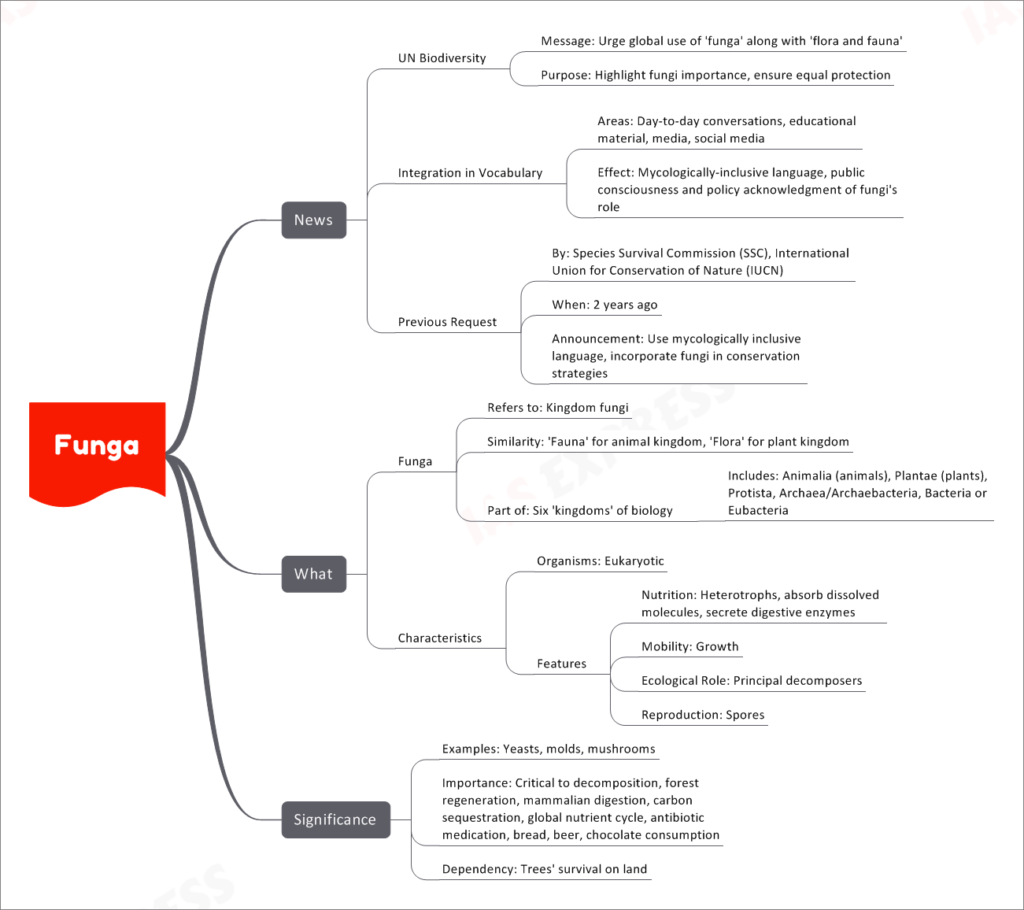Funga

Recent news from the UN Biodiversity front highlights the call for global recognition of ‘funga’ alongside ‘flora and fauna.’ This initiative aims to underscore the significance of fungi and ensure their equal protection in the realm of biodiversity conservation.
Unveiling Funga’s Role: From Language to Ecosystems
Integration in Everyday Language
- Application Areas: The call for incorporating ‘funga’ in day-to-day conversations, educational material, media, and social media.
- Impact: This fosters mycologically-inclusive language, raising public awareness and enabling policy acknowledgment of fungi’s pivotal role.
Past Appeal for Inclusion
- Initiated by: The Species Survival Commission (SSC) of the International Union for Conservation of Nature (IUCN).
- Timeline: This appeal was made two years ago, urging the incorporation of fungi in conservation strategies and inclusive language.
Exploring the Kingdom of Funga
Understanding Funga
- Reference: ‘Funga’ refers to the kingdom of fungi, akin to ‘flora’ for plants and ‘fauna’ for animals.
- Placement: Part of the six fundamental ‘kingdoms’ in biology, including Animalia (animals), Plantae (plants), Protista, Archaea/Archaebacteria, Bacteria or Eubacteria.
Distinctive Characteristics
- Organism Type: Eukaryotic, sharing this feature with animals and plants.
- Key Traits:
- Nutrition Strategy: Heterotrophs, absorbing dissolved molecules and secreting digestive enzymes.
- Growth and Mobility: Characterized by growth rather than mobility.
- Ecological Role: Serve as principal decomposers, essential for ecosystem health.
- Reproduction: Propagate through spores, an essential element of their life cycle.
Unveiling the Significance of Funga
Exemplifying Fungal Diversity
- Examples: Fungi encompass a vast range, including yeasts, molds, and mushrooms.
Critical Ecological Roles
- Importance: Fungi play a pivotal role in diverse ecosystems, serving as essential agents of decomposition, fostering forest regeneration, aiding mammalian digestion, contributing to the global carbon sequestration process, and influencing the nutrient cycle.
Human Dependency and Utilization
- Crucial for Trees: Fungi are vital for the survival of trees on land, forming a symbiotic relationship.
- Human Benefits: They contribute to various aspects of human life, including the production of antibiotic medications, the creation of bread, the fermentation of beer, and the cultivation of chocolate.
If you like this post, please share your feedback in the comments section below so that we will upload more posts like this.

